New Title
Blog & Publications
Learn how Athena Dental is living out its mission and impact. Stay connected as we share recent developments in oral health and how Athena's model is changing the landscape of dentistry.
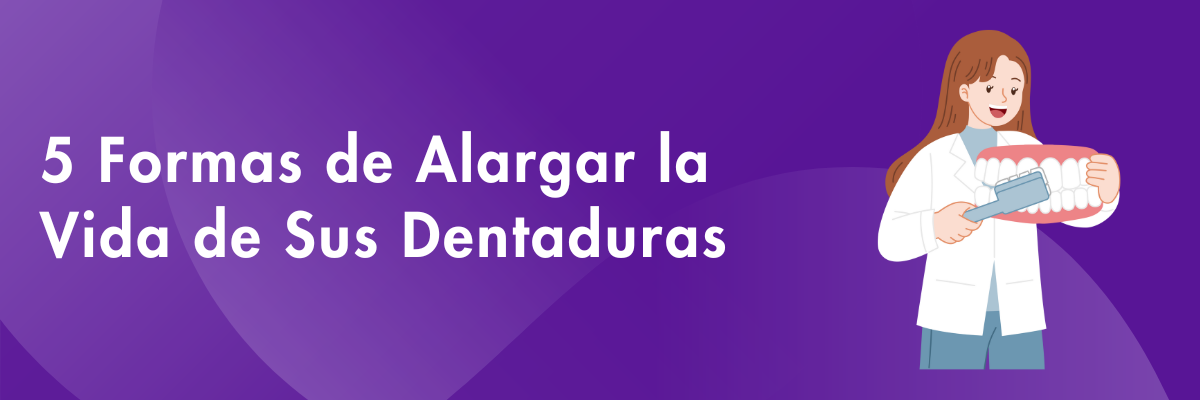
January 15, 2026
Las dentaduras son una inversión valiosa para su comodidad y confianza, pero, como cualquier prótesis dental, requieren cuidado adecuado para durar. Seguir algunos pasos simples puede ayudarle a mantener sus dentaduras, prevenir daños y conservar su sonrisa durante años. Consejos: 1. Límpielas a diario Use un cepillo de cerdas suaves y un limpiador de dentaduras para eliminar restos de comida y placa. Evite la pasta dental común, que puede ser abrasiva. 2. Enjuague después de comer Enjuague las dentaduras con agua después de las comidas para eliminar partículas sueltas. 3. Manejo cuidadoso Las dentaduras son delicadas. Evite dejarlas caer y manipúlelas sobre una toalla doblada o un lavabo lleno de agua. 4. Remojo nocturno Mantenga las dentaduras húmedas remojándolas en agua o solución para dentaduras durante la noche para conservar su forma. 5. Visitas regulares al dentista Acuda a su dentista al menos una vez al año para revisar el ajuste y realizar ajustes si es necesario. Con cuidado constante, sus dentaduras pueden mantenerse cómodas y funcionales durante muchos años. Estos pasos no solo protegen su inversión, sino que también apoyan su salud bucal en general. Referencias: “Denture care: How do I clean dentures?” — Mayo Clinic (denture care FAQ) https://www.mayoclinic.org/healthy-lifestyle/healthy-aging/expert-answers/denture-care/faq-20058375 Mayo Clinic “Denture Care: Fake Teeth, Dental Implants, Denture Cleaning” — Cleveland Clinic Health Library https://my.clevelandclinic.org/health/articles/10901-denture-care Cleveland Clinic “How to properly clean and maintain your false teeth” — Healthline https://www.healthline.com/health/denture-care Healthline “Caring for Your Dentures” — Illinois Department of Public Health (PDF/Guide) https://dph.illinois.gov/topics-services/prevention-wellness/oral-health/fast-facts-oral-health/caring-your-dentures.html Illinois Department of Public Health
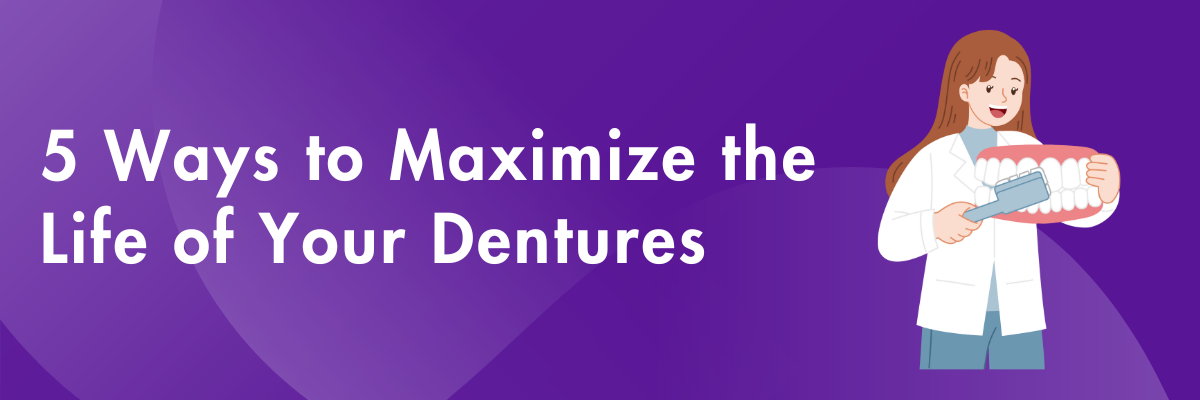
January 15, 2026
Dentures are a valuable investment in your comfort and confidence, but like any dental appliance, they require proper care to last. Following a few simple steps can help you maintain your dentures, prevent damage, and keep your smile looking great for years. Tips: 1. Clean Daily Use a soft-bristled brush and mild denture cleaner to remove food and plaque. Avoid regular toothpaste, which can be abrasive. 2. Rinse After Meals Rinse dentures with water after eating to remove loose particles. 3. Handle with Care Dentures are delicate. Avoid dropping them and handle over a folded towel or sink filled with water. 4. Soak Overnight Keep dentures moist by soaking them in water or a denture solution overnight to maintain their shape. 5. Regular Dental Check-ups Visit your dentist at least once a year to check fit and make any necessary adjustments. With consistent care, your dentures can remain comfortable and functional for many years. Taking these steps not only protects your investment but also supports your overall oral health. Sites/Resources: “Denture care: How do I clean dentures?” — Mayo Clinic (denture care FAQ) https://www.mayoclinic.org/healthy-lifestyle/healthy-aging/expert-answers/denture-care/faq-20058375 Mayo Clinic “Denture Care: Fake Teeth, Dental Implants, Denture Cleaning” — Cleveland Clinic Health Library https://my.clevelandclinic.org/health/articles/10901-denture-care Cleveland Clinic “How to properly clean and maintain your false teeth” — Healthline https://www.healthline.com/health/denture-care Healthline “Caring for Your Dentures” — Illinois Department of Public Health (PDF/Guide) https://dph.illinois.gov/topics-services/prevention-wellness/oral-health/fast-facts-oral-health/caring-your-dentures.html Illinois Department of Public Health

January 1, 2026
La resequez bucal es muy común entre las personas de la tercera edad y puede hacer que comer, hablar y tragar sea más difícil. También aumenta el riesgo de caries, enfermedades de las encías e infecciones. La buena noticia es que hábitos simples diarios pueden ayudar a mantener la boca húmeda, cómoda y saludable. Pasos: 1. Mantente hidratado Bebe agua durante el día para mantener la boca y la garganta húmedas. 2. Estimula la saliva Mastica chicle sin azúcar o usa pastillas de xilitol para aumentar la producción de saliva naturalmente. 3. Evita sustancias que resecan Limita el alcohol, la cafeína y el tabaco, que pueden empeorar la boca seca. 4. Usa sustitutos de saliva o enjuague bucal sin alcohol Estos productos ayudan a mantener la boca húmeda y reducen la incomodidad. Seguir estos pasos simples cada día ayuda a prevenir la resequez bucal, protege los dientes y encías, y mantiene la boca cómoda mientras envejeces. Referencias: Oral Cancer Foundation – https://oralcancerfoundation.org/complications/xerostomia/ The Radiant Smiles – https://theradiantsmiles.com/blog/the-hidden-epidemic-plaguing-arlington-seniors-why-your-dry-mouth-demands-immediate-attention/ Valley Dental Fargo – https://valleydentalfargo.com/oral-health-for-seniors-common-issues-and-how-to-prevent-them/ Atlanta Dentist Midtown – https://atlantadentistmidtown.com/the-importance-of-senior-dental-care-addressing-top-oral-health-issues-for-seniors/
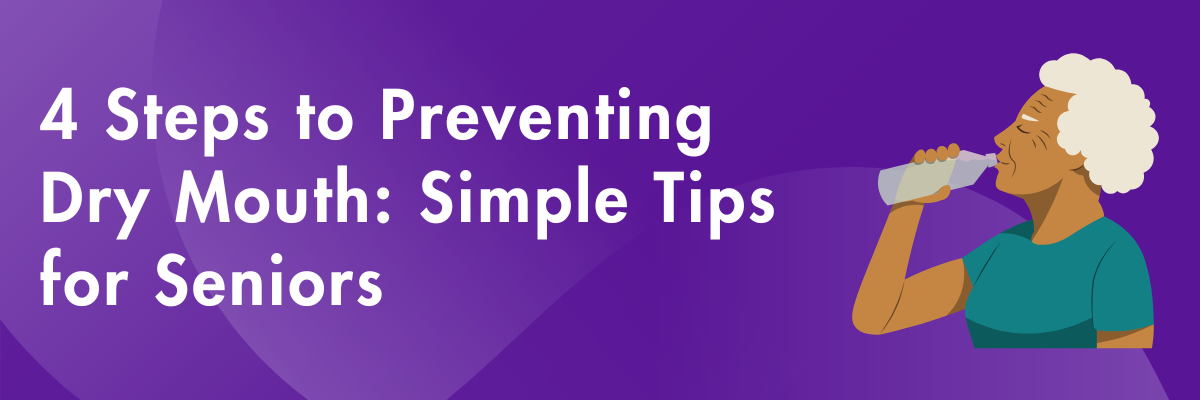
January 1, 2026
Dry mouth is very common among seniors and can make everyday activities like eating, speaking, and swallowing more difficult. It also increases the risk of cavities, gum disease, and oral infections. The good news is that simple daily habits can help keep your mouth moist, comfortable, and healthy. Steps: 1. Stay hydrated Sip water throughout the day to keep your mouth and throat moist. 2. Stimulate saliva Chew sugar-free gum or use xylitol lozenges to naturally boost saliva flow. 3. Avoid drying substances Limit alcohol, caffeine, and tobacco, which can worsen dry mouth. 4. Use saliva substitutes or alcohol-free mouthrinse These products help keep your mouth moist and reduce discomfort. Oral cancer screenings are simple, painless, and potentially lifesaving. Make them a regular part of your dental routine to protect your health and smile. Sites/Resources: Oral Cancer Foundation – https://oralcancerfoundation.org/complications/xerostomia/ The Radiant Smiles – https://theradiantsmiles.com/blog/the-hidden-epidemic-plaguing-arlington-seniors-why-your-dry-mouth-demands-immediate-attention/ Valley Dental Fargo – https://valleydentalfargo.com/oral-health-for-seniors-common-issues-and-how-to-prevent-them/ Atlanta Dentist Midtown – https://atlantadentistmidtown.com/the-importance-of-senior-dental-care-addressing-top-oral-health-issues-for-seniors/
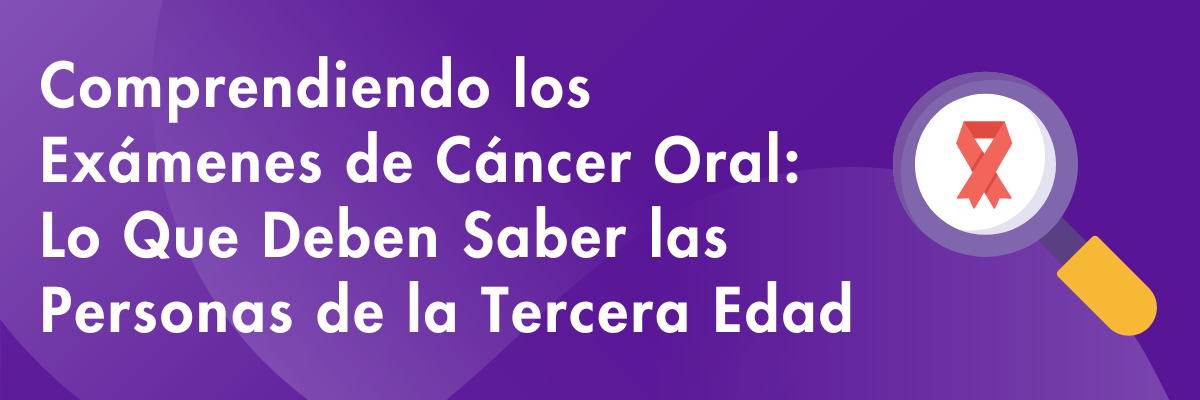
December 18, 2025
El cáncer oral es más común a medida que envejecemos, por eso es muy importante hacerse exámenes dentales regularmente. Detectarlo a tiempo puede salvar vidas, porque permite tratar los problemas antes de que se vuelvan graves. Con revisiones periódicas, los dentistas pueden encontrar señales de alerta y ayudar a mantener la salud de la boca y del cuerpo. Puntos Clave: 1. Revisiones regulares El dentista examina los labios, la lengua, las encías y la garganta para detectar cambios o problemas a tiempo. 2. Señales de alerta Presta atención a llagas que no sanan, bultos, manchas/lesiones rojas o blancas y dificultad para tragar. 3. Factores de riesgo La edad, el tabaco, el alcohol, la exposición al VPH y el daño solar aumentan el riesgo de cáncer oral. 4. Seguimiento Si se encuentra un área sospechosa, puede ser necesaria una biopsia. Tratarlo temprano aumenta mucho las probabilidades de recuperación. Los exámenes de cáncer oral son fáciles, indoloros y pueden salvar vidas. Hazlos parte de tu rutina dental para cuidar tu salud y tu sonrisa. Referencias: MyHealthFinder – https://odphp.health.gov/myhealthfinder/doctor-visits/regular-checkups/oral-health-older-adults-quick-tips Atlanta Dentist Midtown – https://atlantadentistmidtown.com/the-importance-of-senior-dental-care-addressing-top-oral-health-issues-for-seniors/ USC Ostrow – https://ostrowonline.usc.edu/embracing-preventive-oral-care-for-older-adults/

January 15, 2026
Las dentaduras son una inversión valiosa para su comodidad y confianza, pero, como cualquier prótesis dental, requieren cuidado adecuado para durar. Seguir algunos pasos simples puede ayudarle a mantener sus dentaduras, prevenir daños y conservar su sonrisa durante años. Consejos: 1. Límpielas a diario Use un cepillo de cerdas suaves y un limpiador de dentaduras para eliminar restos de comida y placa. Evite la pasta dental común, que puede ser abrasiva. 2. Enjuague después de comer Enjuague las dentaduras con agua después de las comidas para eliminar partículas sueltas. 3. Manejo cuidadoso Las dentaduras son delicadas. Evite dejarlas caer y manipúlelas sobre una toalla doblada o un lavabo lleno de agua. 4. Remojo nocturno Mantenga las dentaduras húmedas remojándolas en agua o solución para dentaduras durante la noche para conservar su forma. 5. Visitas regulares al dentista Acuda a su dentista al menos una vez al año para revisar el ajuste y realizar ajustes si es necesario. Con cuidado constante, sus dentaduras pueden mantenerse cómodas y funcionales durante muchos años. Estos pasos no solo protegen su inversión, sino que también apoyan su salud bucal en general. Referencias: “Denture care: How do I clean dentures?” — Mayo Clinic (denture care FAQ) https://www.mayoclinic.org/healthy-lifestyle/healthy-aging/expert-answers/denture-care/faq-20058375 Mayo Clinic “Denture Care: Fake Teeth, Dental Implants, Denture Cleaning” — Cleveland Clinic Health Library https://my.clevelandclinic.org/health/articles/10901-denture-care Cleveland Clinic “How to properly clean and maintain your false teeth” — Healthline https://www.healthline.com/health/denture-care Healthline “Caring for Your Dentures” — Illinois Department of Public Health (PDF/Guide) https://dph.illinois.gov/topics-services/prevention-wellness/oral-health/fast-facts-oral-health/caring-your-dentures.html Illinois Department of Public Health

January 15, 2026
Dentures are a valuable investment in your comfort and confidence, but like any dental appliance, they require proper care to last. Following a few simple steps can help you maintain your dentures, prevent damage, and keep your smile looking great for years. Tips: 1. Clean Daily Use a soft-bristled brush and mild denture cleaner to remove food and plaque. Avoid regular toothpaste, which can be abrasive. 2. Rinse After Meals Rinse dentures with water after eating to remove loose particles. 3. Handle with Care Dentures are delicate. Avoid dropping them and handle over a folded towel or sink filled with water. 4. Soak Overnight Keep dentures moist by soaking them in water or a denture solution overnight to maintain their shape. 5. Regular Dental Check-ups Visit your dentist at least once a year to check fit and make any necessary adjustments. With consistent care, your dentures can remain comfortable and functional for many years. Taking these steps not only protects your investment but also supports your overall oral health. Sites/Resources: “Denture care: How do I clean dentures?” — Mayo Clinic (denture care FAQ) https://www.mayoclinic.org/healthy-lifestyle/healthy-aging/expert-answers/denture-care/faq-20058375 Mayo Clinic “Denture Care: Fake Teeth, Dental Implants, Denture Cleaning” — Cleveland Clinic Health Library https://my.clevelandclinic.org/health/articles/10901-denture-care Cleveland Clinic “How to properly clean and maintain your false teeth” — Healthline https://www.healthline.com/health/denture-care Healthline “Caring for Your Dentures” — Illinois Department of Public Health (PDF/Guide) https://dph.illinois.gov/topics-services/prevention-wellness/oral-health/fast-facts-oral-health/caring-your-dentures.html Illinois Department of Public Health

January 1, 2026
La resequez bucal es muy común entre las personas de la tercera edad y puede hacer que comer, hablar y tragar sea más difícil. También aumenta el riesgo de caries, enfermedades de las encías e infecciones. La buena noticia es que hábitos simples diarios pueden ayudar a mantener la boca húmeda, cómoda y saludable. Pasos: 1. Mantente hidratado Bebe agua durante el día para mantener la boca y la garganta húmedas. 2. Estimula la saliva Mastica chicle sin azúcar o usa pastillas de xilitol para aumentar la producción de saliva naturalmente. 3. Evita sustancias que resecan Limita el alcohol, la cafeína y el tabaco, que pueden empeorar la boca seca. 4. Usa sustitutos de saliva o enjuague bucal sin alcohol Estos productos ayudan a mantener la boca húmeda y reducen la incomodidad. Seguir estos pasos simples cada día ayuda a prevenir la resequez bucal, protege los dientes y encías, y mantiene la boca cómoda mientras envejeces. Referencias: Oral Cancer Foundation – https://oralcancerfoundation.org/complications/xerostomia/ The Radiant Smiles – https://theradiantsmiles.com/blog/the-hidden-epidemic-plaguing-arlington-seniors-why-your-dry-mouth-demands-immediate-attention/ Valley Dental Fargo – https://valleydentalfargo.com/oral-health-for-seniors-common-issues-and-how-to-prevent-them/ Atlanta Dentist Midtown – https://atlantadentistmidtown.com/the-importance-of-senior-dental-care-addressing-top-oral-health-issues-for-seniors/

January 1, 2026
Dry mouth is very common among seniors and can make everyday activities like eating, speaking, and swallowing more difficult. It also increases the risk of cavities, gum disease, and oral infections. The good news is that simple daily habits can help keep your mouth moist, comfortable, and healthy. Steps: 1. Stay hydrated Sip water throughout the day to keep your mouth and throat moist. 2. Stimulate saliva Chew sugar-free gum or use xylitol lozenges to naturally boost saliva flow. 3. Avoid drying substances Limit alcohol, caffeine, and tobacco, which can worsen dry mouth. 4. Use saliva substitutes or alcohol-free mouthrinse These products help keep your mouth moist and reduce discomfort. Oral cancer screenings are simple, painless, and potentially lifesaving. Make them a regular part of your dental routine to protect your health and smile. Sites/Resources: Oral Cancer Foundation – https://oralcancerfoundation.org/complications/xerostomia/ The Radiant Smiles – https://theradiantsmiles.com/blog/the-hidden-epidemic-plaguing-arlington-seniors-why-your-dry-mouth-demands-immediate-attention/ Valley Dental Fargo – https://valleydentalfargo.com/oral-health-for-seniors-common-issues-and-how-to-prevent-them/ Atlanta Dentist Midtown – https://atlantadentistmidtown.com/the-importance-of-senior-dental-care-addressing-top-oral-health-issues-for-seniors/

January 15, 2026
Dentures are a valuable investment in your comfort and confidence, but like any dental appliance, they require proper care to last. Following a few simple steps can help you maintain your dentures, prevent damage, and keep your smile looking great for years. Tips: 1. Clean Daily Use a soft-bristled brush and mild denture cleaner to remove food and plaque. Avoid regular toothpaste, which can be abrasive. 2. Rinse After Meals Rinse dentures with water after eating to remove loose particles. 3. Handle with Care Dentures are delicate. Avoid dropping them and handle over a folded towel or sink filled with water. 4. Soak Overnight Keep dentures moist by soaking them in water or a denture solution overnight to maintain their shape. 5. Regular Dental Check-ups Visit your dentist at least once a year to check fit and make any necessary adjustments. With consistent care, your dentures can remain comfortable and functional for many years. Taking these steps not only protects your investment but also supports your overall oral health. Sites/Resources: “Denture care: How do I clean dentures?” — Mayo Clinic (denture care FAQ) https://www.mayoclinic.org/healthy-lifestyle/healthy-aging/expert-answers/denture-care/faq-20058375 Mayo Clinic “Denture Care: Fake Teeth, Dental Implants, Denture Cleaning” — Cleveland Clinic Health Library https://my.clevelandclinic.org/health/articles/10901-denture-care Cleveland Clinic “How to properly clean and maintain your false teeth” — Healthline https://www.healthline.com/health/denture-care Healthline “Caring for Your Dentures” — Illinois Department of Public Health (PDF/Guide) https://dph.illinois.gov/topics-services/prevention-wellness/oral-health/fast-facts-oral-health/caring-your-dentures.html Illinois Department of Public Health

January 1, 2026
Dry mouth is very common among seniors and can make everyday activities like eating, speaking, and swallowing more difficult. It also increases the risk of cavities, gum disease, and oral infections. The good news is that simple daily habits can help keep your mouth moist, comfortable, and healthy. Steps: 1. Stay hydrated Sip water throughout the day to keep your mouth and throat moist. 2. Stimulate saliva Chew sugar-free gum or use xylitol lozenges to naturally boost saliva flow. 3. Avoid drying substances Limit alcohol, caffeine, and tobacco, which can worsen dry mouth. 4. Use saliva substitutes or alcohol-free mouthrinse These products help keep your mouth moist and reduce discomfort. Oral cancer screenings are simple, painless, and potentially lifesaving. Make them a regular part of your dental routine to protect your health and smile. Sites/Resources: Oral Cancer Foundation – https://oralcancerfoundation.org/complications/xerostomia/ The Radiant Smiles – https://theradiantsmiles.com/blog/the-hidden-epidemic-plaguing-arlington-seniors-why-your-dry-mouth-demands-immediate-attention/ Valley Dental Fargo – https://valleydentalfargo.com/oral-health-for-seniors-common-issues-and-how-to-prevent-them/ Atlanta Dentist Midtown – https://atlantadentistmidtown.com/the-importance-of-senior-dental-care-addressing-top-oral-health-issues-for-seniors/

December 18, 2025
Oral cancer becomes more common as we age, making regular dental screenings extremely important. Early detection can save lives by catching problems before they become serious. With routine exams, dentists can spot warning signs, recommend treatment quickly, and help seniors maintain both their oral health and overall well-being. Key Points: 1. Regular inspections Dentists examine the lips, tongue, gums, and throat to spot any changes or abnormalities early. 2. Early warning signs Look out for sores that don’t heal, lumps, red or white patches, and difficulty swallowing. 3. Risk factors Age, tobacco use, alcohol consumption, HPV exposure, and sun damage can increase the chance of oral cancer. 4. Follow-up If a suspicious area is found, a biopsy may be needed. Early treatment significantly improves survival rates. Oral cancer screenings are simple, painless, and potentially lifesaving. Make them a regular part of your dental routine to protect your health and smile. Sites/Resources: MyHealthFinder – https://odphp.health.gov/myhealthfinder/doctor-visits/regular-checkups/oral-health-older-adults-quick-tips Atlanta Dentist Midtown – https://atlantadentistmidtown.com/the-importance-of-senior-dental-care-addressing-top-oral-health-issues-for-seniors/ USC Ostrow – https://ostrowonline.usc.edu/embracing-preventive-oral-care-for-older-adults/
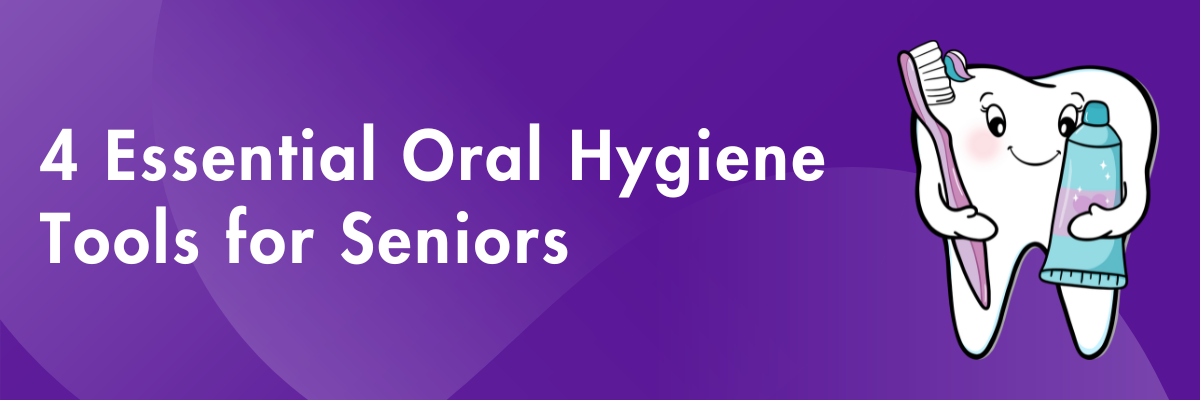
December 4, 2025
As we age, our oral health needs change. Older adults often face unique challenges like sensitive gums, worn teeth, or difficulty reaching certain areas of the mouth. The good news is that the right dental tools can make daily care much easier and more effective, helping you maintain a healthy, comfortable mouth. Essential Tools: 1. S oft-bristled or electric toothbrush Gentle on sensitive gums and easy to handle, these brushes make cleaning more comfortable and effective. 2. Interdental brushes or floss holders These tools reach tight spaces between teeth, removing plaque that a regular toothbrush might miss. 3. T ongue scraper Helps remove bacteria from the tongue, reducing bad breath and keeping your mouth fresher. 4. Alcohol-free fluoride mouthrinse Protects tooth enamel, strengthens teeth, and helps keep your mouth moist. Using these tools every day can make oral hygiene simpler, safer, and more effective. With the right tools, seniors can enjoy healthier teeth, gums, and a more confident smile. Sites/Resources: Georgetown Smile – https://georgetownsmile.com/blog/senior-oral-health-navigating-the-unique-challenges-of-aging-teeth-and-gums-2/ MyHealthFinder – https://odphp.health.gov/myhealthfinder/doctor-visits/regular-checkups/oral-health-older-adults-quick-tips Atlanta Dentist Midtown – https://atlantadentistmidtown.com/the-importance-of-senior-dental-care-addressing-top-oral-health-issues-for-seniors/ Valley Dental Fargo – https://valleydentalfargo.com/oral-health-for-seniors-common-issues-and-how-to-prevent-them/



